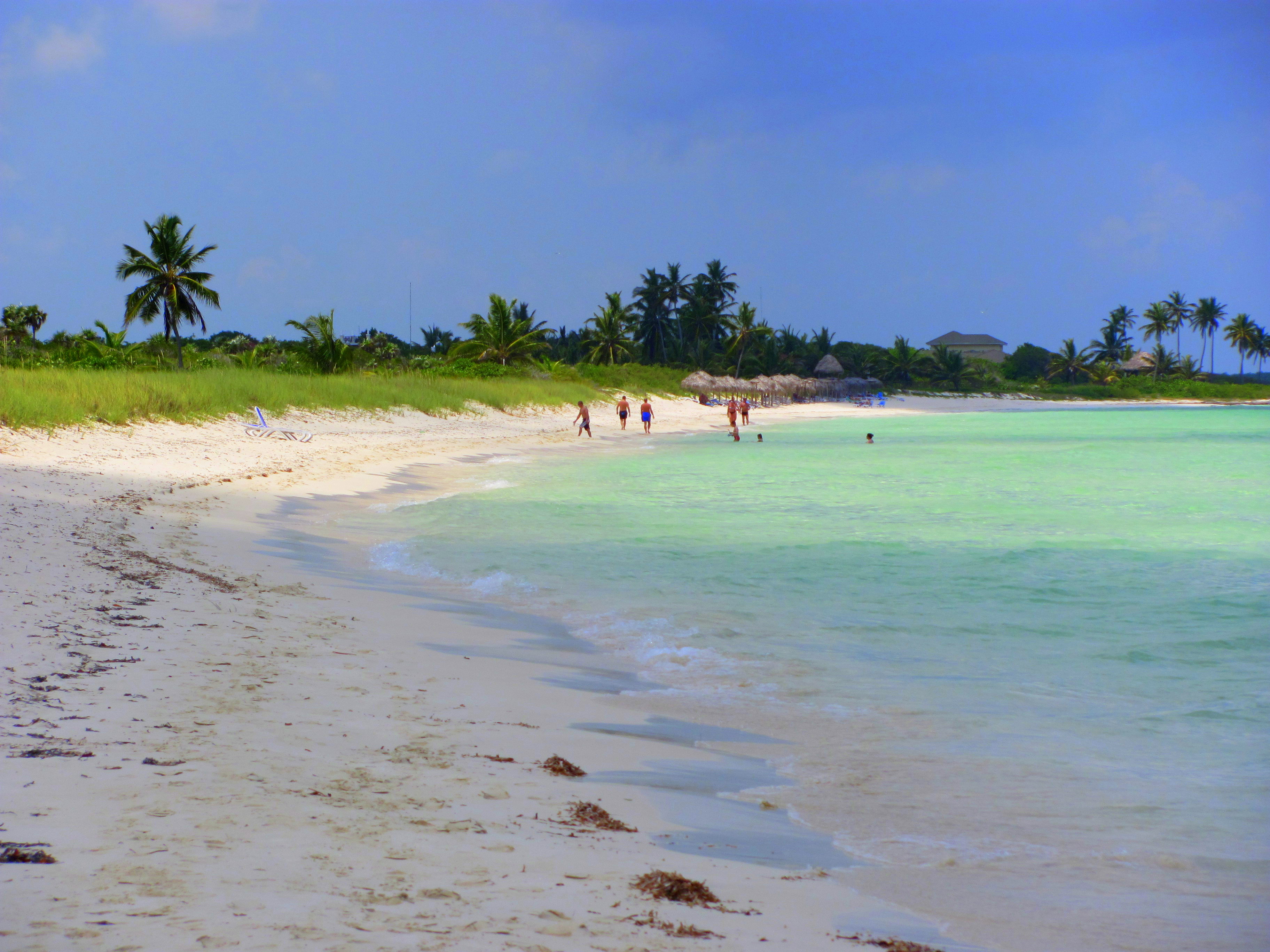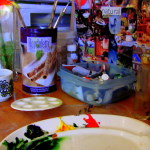Canada is an interesting country. The people are careful in our friendliness and things are often left to understanding and not words. Kind gestures extend as part of conscious guilt and an aversion to making waves: please, thank you, sorry, sorry, sorry. A kind smile and awkward chit-chat about hockey.
We stand inside our pristine brick fortresses, in quiet neighbourhoods that are walking distance from good schools and we fill our flesh to prove to ourselves that our houses are not too big for us, that we really do need all the space. Things are bigger, but social circles are not. In our quiet surroundings, in our inhibited social reserve, we are sterile, septic and retracted, like the weather we endure for so many months of the year.
Driving through Cuba, the Canadians eyed 7 x 10 metered shacks, held up by a neighbour’s nails, holes welcome in the sea breeze as families lean against the front stoop. Freshly washed laundry waves in the breeze, flags symbolizing an uprising and then a plateau. Locals watch us as they expand into a chair, concentrating on the faint tickle of breeze on sticky hot skin, or lean against the door frame, casually eyeing this common trespass of foreigners. The Canadians watch the endless scene, house after house, an endless train of clothes lines, with a twist of fascinated guilt. Flesh memories of the softness of their beds, the gourmet food heavy in their stomachs fill their hearts with the dull burdensome ache of privilege, but their minds assure them of their powerlessness to change any of it.
“In Cuba, when someone has nice clothes, we know that they are brought here from AFUERA!” Jokes G, a Cuban and fast-friend I met on the beach. “The clothes and goods here in Cuba are, to put it politely, not very nice. But in your country, in Canada, everything is made to last, everything looks beautiful.” To the Cubans, afuera, or outside (of Cuba), is synonymous with quality.
Hearing this, I self-consciously bury my hands in the pockets of the the made-in-China shorts I got at H&M, which were a snap purchase, and will probably barely make it through the summer. Behind the friendly jokes and the toothy Cuban smile, I feel accused of splurging on silk robes while walking around in a land where everyone wears rags. Of course, with some of the best healthcare and education in the Caribbean, the downside of the revolution may be mostly a lack of material goods, Materialism, who despite her spiritual worthlessness is the god we pray to.
However, there is something stickier than materialism that seems to inject a certain joy and spirit of community into the hearts of Cuban socialists. Music, laughter, kind words and off-handed claps on the shoulder, as interpersonal connections blossom, characterize the Caribbean style of communication. Deep bonds are formed between strangers and hugs are tossed around with a reckless abandon that can at first can be threatening to the frigid, but kind, Canadian. And as I observe my fellow foreigners in the midst of this, and then our lives after we’ve returned home, I realized how impoverished our country has become. We lap up the warm smiles and friendly waves with the delirious fever of an abandoned castaway presented with cool spring water. At home, while we may be able to splurge our credit allocations on cheap plastic shit, we seem to be missing a key piece in the Great Happiness Puzzle—a sense of community and connection to each other.
Perhaps the large houses and the lifeless goods we’ve spent generations accumulating and built up around ourselves is only hindering our ability to survive. We pump music into our ears, shade our vision with Chanel lenses and calm our blood with the newest slow-release antidepressant. We keep ourselves contained in our invisible personal pods of comfort and thus we never fully live or learn the limits to our expansion.
We don’t have warm crystal-clear seawater, hot weather that melts our flesh into the atoms that surround it and merengue beats pumping the blood in our veins, but we do possess that same genetic code that deems possible the expansion of our selves.
From young adulthood we’ve been trying to find the answer to our desperate cry to fit in. Maybe, just maybe, buying the right clothes, listening to the right music or doing the right drugs will help me meld into those around me, will give me a sense of belonging and purpose. However, perhaps what the media tries to sell us is in fact a lie, no matter how maxed out our credit cards, the answer is simple: a smile, kind words, laughter and a friendly clap on the shoulder of a stranger as we begin to break through the icy pods that keep us separate from one another.









This will be the second blog I have seen that paints a depressing picture of Canada. Still, it is good to see Cuba as a friendly place to visit.
Sorry, didn’t mean to be depressing! In fact I love Canada. This post is simply a reflection of the failure of material goods to provide richness and community spirit to people’s lives. We are privileged in the North (US and Canada) and with our privilege, I feel, we often lose sight of the true riches of what it is to be human. Thanks for commenting!
‘Things are bigger, but social circles are not.’ Another jewel, Tata. I do find myself saying sorry copiously nowadays. We should do a joint report on Cuba.
Gracias, Fercho. Tengo un libro que te puedo prestar. Se llama, ¨The Cuba Reader: History, culture and politics.¨ Contiene artículos escritos por Fidel, El Che, Silvio Rodriguez y la hija de Noam Chomsky, entre otros. Hagamos el reportaje y lo presentarémos en nuestra conferencia!
me dio escalofríos jijiji te quiero, viva cuba! and our R. WALL 😉
Karin! Me encontraste! Te digo que todavía tengo lo que queda del nuestro muro de los revolucionarios, una foto gigante del Che, pegado en la pared de mi cuarto en la casa de mis padres. Cada vez que la miro, quedo pensando en nuestros ídolos. Haste siempre, comandante.
I find so many people in the US, Florida even, so close to Miami, and with so many Cuban exiles living here have no understanding of how “lacking” things are in Cuba.
They are stunned when I explain that my Uncle is not allowed to eat the lemons that grow on the tree in his yard – as they belong to “The Republic” and will be collected later by children in the Communist Youth groups.
They are also stunned that this could be possible at all. How can someone allow people to come and take their lemons – just like that?
My friends in the US don’t realize there are neighbors on literally EVERY Cuban block who get perks for openly watching their neighbors. These neighbors come by and count the lemons, and inquire why there are two missing? If they fell from the tree, where are the husks?
If you have a party – these neighbors drop by. Then the neighbors look around and may ask questions like – “I see dinner was made with 4 pots – last week you only had 3 – where did this big pot come from?” (Because you may have illegally sold, say one of those lemons or some other black market trade to get this pot you see…)
This week the daughter of the Vice President of Cuba defected and is living now in Tampa. She had been granted permission to leave Cuba to attend a seminar in Mexico. She crossed the Mexican boarder into the United States, a few days ago as I write this on August 30th, 2012.
Really. When people of that level in the government are defecting and coming to live in the US – what does that say about the country? Sure. It must be a great place.
I agree. I think Cubans, as people are awesome. They are friendly. They seem to always find a way to smile in the face of what would be unbearably depressing to many. Where the Russian became stern and stoic – Cubans are convivial.
It is Fidel Castro’s revolution that has been a slow festering death to a wonderful country.
@MadelineHere
American Daughter of a Cuban Exile.
http://MadelineHere.info
Thanks, Madeline for the passionate, well-thought comment. You’re right, we foreigners are oblivious to many of the realities that the people of Cuba face. My article was simply a reflection of the wonderful impression I got of the people of Cuba. There is clearly much more depth to Cuban society than meets the eye. Thanks again for your comment.